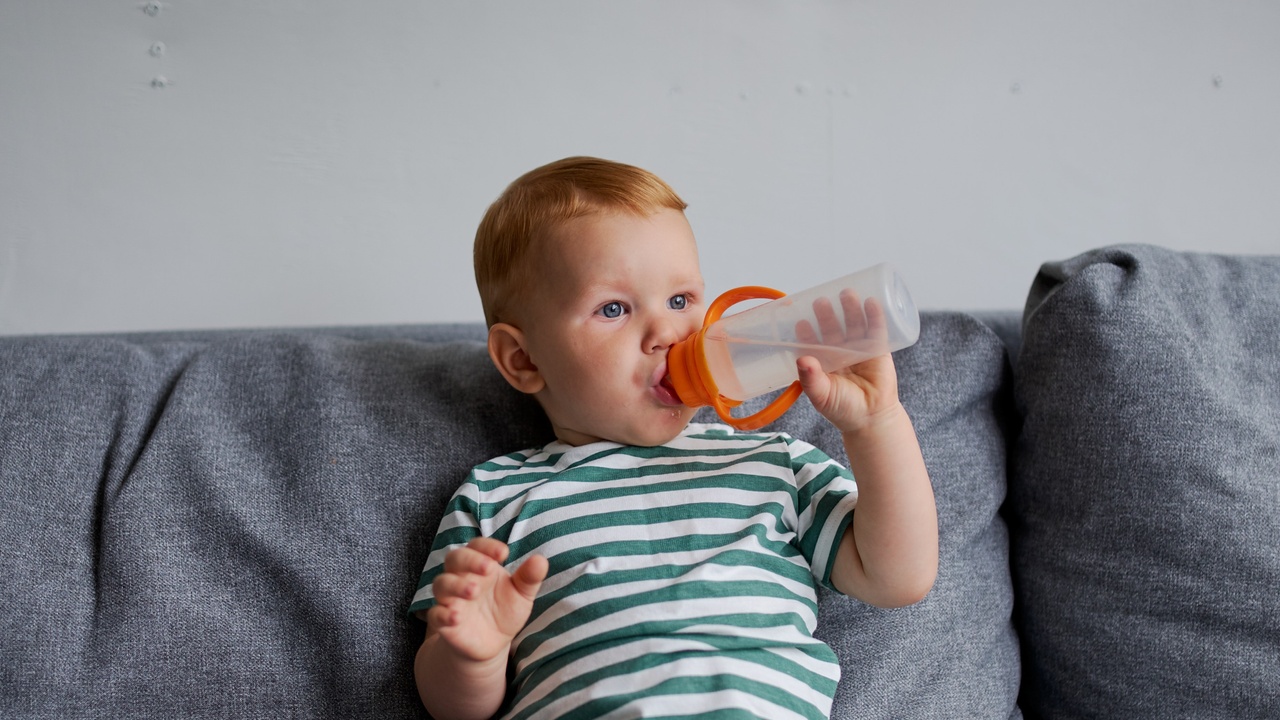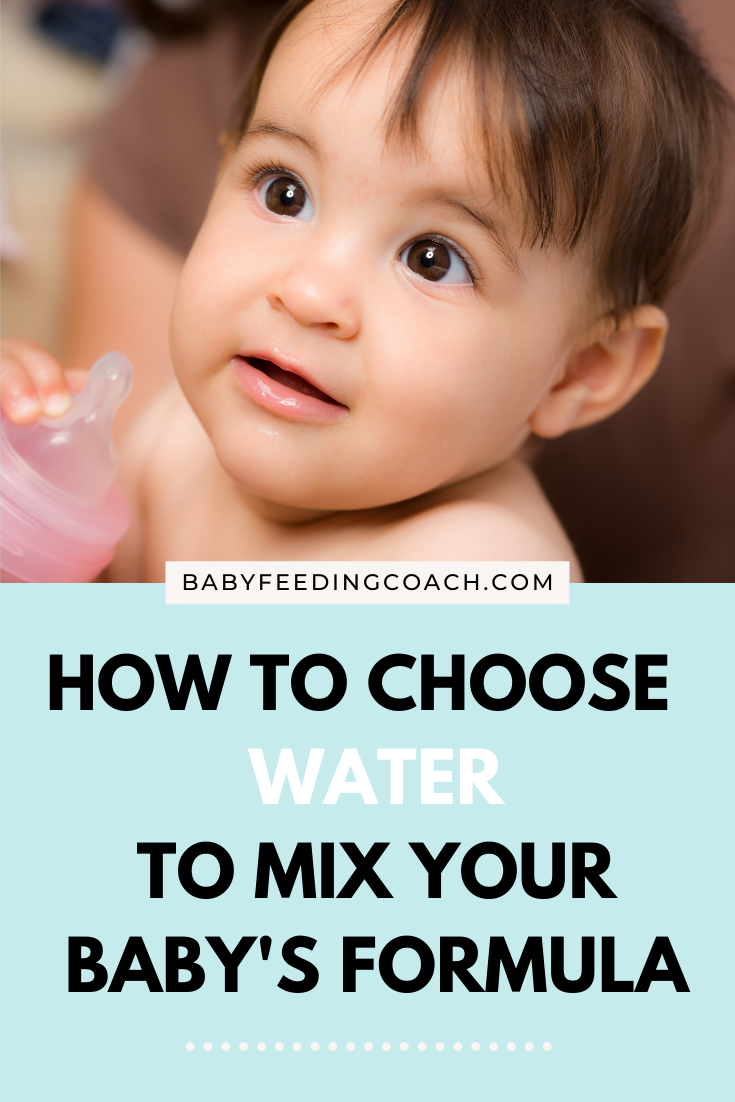What Water to Use for Baby Formula
Dec 20, 2021
One of my biggest passions is to answer all of your questions about baby formula in order to make you feel more comfortable with all of the decisions you have to make as a new mom.
One question that always pops up is:
What water do I use to mix my baby’s powdered formula?
Right next to the formula in the store is nursery water. Does this mean it is the best option or is tap water okay? Do I need to boil water, and if so, how do I do it?
I created this post for you to learn more about what makes each water different so you can see what the best option is for your family.
>>> Looking for more information on combining formula and breastmilk? The Simple Guide to Combination Feeding will help you feel confident while breastfeeding, formula feeding or mixed feeding from birth to your baby's first birthday. <<<
Official Water Recommendations from AAP & CDC
Let’s first chat about what the official guidelines are for choosing water.
The American Academy of Pediatrics states:
“Potable (this means drinkable) water must be used. Most municipal tap water is safe, but use cold water from the faucet. Warm tap water may contain softener salt that can pull impurities from pipes. Water from a well should be tested every year to make sure it is free of harmful bacteria or chemicals like nitrate. If bacteria in water is a concern in your community, bring water to a rolling boil for 1 minute and then cool it to room temperature before using. Bottled water also can be used to make formula.
The Center for Disease Control states:
"Use water from a safe source to mix your infant formula. If you are not sure if your tap water is safe to use for preparing infant formula, contact your local health department."
So what does this mean for you and what should you choose?
Really, ANY water that is free of bacteria and is from a safe water source is likely fine.
I am going to break down the different options for water, including the pros and cons of each so you can determine what works best for you.
What water to use for baby formula: different options
Tap Water
Most tap water is perfectly fine for your baby. It is recommended that you only use cold tap water since warm water may have “impurities” such as lead or other heavy metals. You also must make sure your municipal tap water is safe.
There may also be concerns about fluoride. Fluoride is in many water sources in the US to help prevent tooth decay. Your baby does not need fluoridated water before their first tooth appears, but it is usually not harmful if you use fluoridated water to mix formula. The risk is fluorosis, which appears as white streaks on their teeth in mild cases (AAP).
Pro: Easy and is likely safe in most places in the US.
Con: Cannot use warm water. May not be safe in some areas. Fluoride concerns (see the section on fluoride).
Tip: You can figure out if your tap water is safe by searching your town’s name and water report. This will tell you all of the minerals found in your water.
Filtered Tap Water
Filtered tap water goes through a home purification process. Filters such as the standard Brita filter remove chlorine, mercury, cadmium, copper and zinc. Other filters are even stronger and remove items such as lead, benzene and asbestos, which may be harmful.
Pro: Easy and available in most places in the US.
Con: Some filters can be pricey. May require some research to find a filter that works well for your family. Filters need to be replaced. Water still needs to be from a safe water source.
Distilled/Nursery Water: Distilled water is steam from boiling water that has been cooled and returned back into liquid water. This process removes the majority (if not all) minerals. There are brands with and without fluoride.
Pro: It is easy. You can choose fluoride or non-fluoride. It is a good option if you have well water or your water source is not clean.
Con: It is expensive and isn’t absolutely necessary. It doesn’t taste very good. May require separate fluoride treatments or supplementation when your baby gets teeth.
Bottled Water: Bottled water ingredients and features will vary. Some are from springs, wells, or tap water that may be fortified with different minerals. If you are buying bottled water in the United States, it is FDA reviewed and okay to use to mix formula.
Pro: Convenient and available.
Con: Plastic waste. May be expensive. May not be any safer than tap water.
Well Water: Well water is water that comes from the ground from a natural water source. It is often used in rural areas. Studies show that well water is more likely to contain nitrates as a byproduct of farming practices. This can put babies at risk for nitrate poisoning. There is more risk for contamination including viruses, bacteria, heavy metals, and man-made chemicals. The American Academy of Pediatrics recommends testing well water for nitrates every 3 months. Well water can also be boiled, which will decrease the risk for bacteria and viruses.
Pro: May be the only water source in some areas.
Con: Needs to be tested frequently. May be riskier for contamination.
There are other types of water out there, but these are the most commonly asked about.
Speaking of boiling water… Do you need to do it?
Should you boil water for baby formula?
The CDC and AAP give conflicting information about boiling water.
The AAP recommends boiling water only if you are uncertain about the safety of your water.
The CDC recommends boiling water to prevent Cronobacter, which is a bacteria that can be found in powdered infant formula. The bacteria may cause serious infections such as urinary tract infections and bloodstream infections that could be deadly. Most older babies can fight the bacteria without having any consequences, but babies under 3 months, those who are immunocompromised, or those who were born prematurely may not be able to.
This is an issue with infant formula, not with the purity of the water source. Because of this, the formula has to be boiled and prepared in a certain way to kill any potential bacteria in the powdered formula.
Let's get this straight though...powdered infant formula is EXTREMELY safe and is tested. It is incredibly rare to find Cronobacter in powdered formula.
How to boil water for powdered formula to prevent Cronobacter infections:
-
Bring water to a boil.
-
Turn off heat and let water cool to no less than 158 degrees F.
-
Pour desired amount into the bottle.
-
Mix powdered formula as normal.
-
Mix and cool.
-
Serve to your baby.
In order to kill Cronobacter, the powdered formula needs to be mixed while the water is at least 158 degrees F. My recommendation is to use a food thermometer that is clean or sterilized. Transfer the water to the bottle when it is somewhere between 175-200 degrees F and then mix the formula in.
Boiling water to kill viruses/ potential bacteria:
-
Bring water to a boil for no longer than 1 minute.
-
Cool to drinking temp.
-
Mix formula or store in the fridge.
Different sources tell you to boil water for different lengths of time. The AAP states that boiling water for longer than one minute can increase the risk for impurities.
Now, we can’t end our talk about water without discussing fluoride more in-depth.
Should I be concerned about the fluoride in water?
There is a lot of information circulating out there about fluoride. Fluoride is a mineral that has been proven to strengthen teeth enamel and prevent cavities.
Under the age of 6 months, there is no need for water with fluoride in it, though it has not been proven to be harmful. The AAP recommends using fluoridated water for infant formula and drinking water after 6 months.
In addition, the AAP continues to recommend using a rice-grain-sized amount of fluoridated toothpaste after the first tooth erupts. They also recommend fluoride varnish every 6 months.
Fluoridated water sources should be at or below 0.7 mg/L.
The risk of fluorosis occurs when someone is exposed to too much fluoride in their diet, water, or toothpaste. It is usually harmless unless it continues to happen over time. There have been many studies done on increased fluoride levels being related to certain cancers of the bone. So far these are inconclusive, but it is worth it to assess your baby’s fluoride needs vs what they are actually getting.
Remember, some municipal drinking waters are fluoridated and some are not. Some bottled waters have fluoride and some do not. Some nursery waters have fluoride and some do not. I would do a little digging if this is important to you.
And remember…infant formula already contains fluoride.
So phew! That is a lot of information on baby formula and a lot more information on water.
I hope this gives you some food…err I mean…water for thought (bad joke) and helps you figure out what water is the best for your baby.
Let me know if you have questions or what water your baby uses!

>>> Tired of worrying about feeding your baby? Get personalized support so you can enjoy feeding your baby. <<<
Free Resource for Parents and Medical Providers:
The Baby Feeding Database
Helping you understand what formulas are available and narrow down what is best for your family.
This will sign you up for the Baby Feeding Coach email list. I will not spam you. Opt out anytime.


